WASHINGTON, DC – Gestern verkündete Präsident Donald Trump auf diesem Truth Social-Account, dass er eine Zinsbegrenzung für Kreditkarten im Eilverfahren in Kraft setzen werde. “Mit Wirkung vom 20. Januar 2026 werde ich als Präsident …“.

Im Herzen Amerikas gibt es keine stillere und doch effektivere Energiewirtschaft als die private Güterbahn. Sie ist still, weil Millionen von Verbrauchern auf sie angewiesen sind, um...

Das parteiübergreifende populistische Duo aus Washington, Senator Bernie Sanders und Senator Josh Hawley, hat einen Plan zur Lösung des Problems der Kreditkartenschulden – sie versprechen, den Verbrauchern zu “helfen”, indem sie ihnen stillschweigend den Zugang zu ihren Krediten verwehren….

Die Unternehmen hinter Tony the Tiger, Fruit Loops, Heinz Ketchup, Coca-Cola, Oreo und Lucky Charms haben sich anwaltlich beraten lassen, da die Regierung sie verklagt. Anfang des Monats startete San Francisco ein Verfahren….

Noch vor nicht einmal einem Jahr war Robert F. Kennedy Jr. ein gut bezahlter Partner der auf Personenschäden spezialisierten Anwaltskanzlei Morgan & Morgan, der größten und profitabelsten Kanzlei des Landes,...

COLUMBUS, OH – Am Donnerstag gab Ohios Gouverneur Mike DeWine bekannt, dass er die Apothekerkammer von Ohio offiziell auffordert, eine Notverordnung zu erlassen, um Kratom-Alkaloide, einschließlich 7-Hydroxymitragynin, zu verbieten...

Ein Gesetzesvorschlag zur Deckelung der Kreditkartenzinsen auf 101 £ pro 4 £ würde die Kreditvergabe an alle Kreditnehmer – insbesondere an risikoreiche und einkommensschwache Kreditnehmer – einschränken und die Verbraucherkosten durch Gebühren und … erhöhen.

WASHINGTON, DC – Das Consumer Choice Center hat heute eine neue politische Einführung zu einem Bundesvorschlag zur Deckelung der Kreditkartenzinsen veröffentlicht und die sozialen und wirtschaftlichen Kosten analysiert….

WASHINGTON, DC – Am Dienstag führten Agenten des Justizministeriums, des US Marshals Service und der Lebensmittel- und Arzneimittelbehörde (FDA) in Kansas City, Missouri, eine Razzia durch und beschlagnahmten mehr als 73.000 Einheiten...

Als Geschäftsführerin von Florida CALA war ich bestürzt – aber nicht überrascht –, den jüngsten Bericht der American Tort Reform Association mit dem Titel “Sanktionierbar” zu lesen, der die zunehmenden Folgen systemischer Missstände beleuchtet….

WASHINGTON, DC – In einer heute vom US-Bezirksgericht für den District of Columbia verkündeten weitreichenden Entscheidung hat Richter James E. Boasberg den seit einem halben Jahrzehnt andauernden Versuch der FTC, sich von der Zusammenarbeit mit der Federal Trade Commission (FTC) zu lösen, scharf kritisiert.

Das Consumer Choice Center hat heute einen Brief an den Vorsitzenden des Surface Transportation Board geschickt, in dem es die Fusion der Güterbahnunternehmen Union Pacific und Norfolk Southern unterstützt. Modernisierung des Schienenverkehrs...